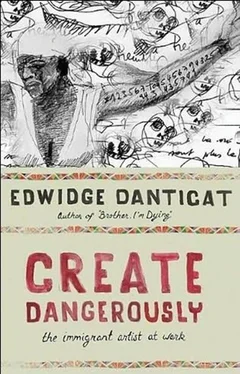“Ah, Edwidge,” Tante Ilyana takes my face in her firm, large hands. “Mira’s daughter.”
Tante Ilyana and Uncle Joseph exchange family news while Nick and I join in the corn grinding. Occasionally Tante Ilyana shouts questions to me about my parents and three brothers in New York. Has my father lost his hair? Has my mother lost weight, gained weight since my uncle showed her the last family photographs? Were any of my brothers married?
I show her a few pictures I brought for her, of my father and his receding hairline, of my plump mother, and of my three brothers, two of whom became fathers that year. With all the family news out of the way, there is nothing left to do but eat.
It is corn harvest season in the valley surrounding Tante Ilyana’s house. So over the next three days, we eat lots of corn. We grill ears of corn over charcoal and firewood sticks in the thatched cooking shack by the stream. We boil them smothered with banana leaves in an aluminum pot that seems to have no bottom. We eat the sweet baby ones raw, right off the cob. From an earlier harvest, we have cornmeal paste, mayi moulen , for breakfast and a sweet corn flour puree, labouyi , for supper.
Things get going quickly that afternoon, as Uncle Joseph and Nick, who are staying nearby at the house of the school’s headmistress, spend their time visiting with parents and meeting teachers, and I attach myself to Tante Ilyana.
That night over a bowl of labouyi , Uncle Joseph tries to convince Tante Ilyana to move to Port-au-Prince to be closer, in her old age, to him and his family.
“You’re an old woman,” he says. “Not that I’m wishing it, but if something happens to you, you won’t be able to see a proper doctor. People die from simple illnesses here. When Jeanne died, we were barely able to arrive in time for the funeral. If you die, not that I’m wishing it, it takes so long to get here that we may not be able to see you one last time. There is no chance that your brothers in New York, Edwidge, and the others will have time to come and say good-bye. You know yourself that a corpse can last only a day or two here.”
Uncle Joseph’s monologue is interrupted by two shots of gunfire from somewhere in the distance. Tante Ilyana explains that it is the village chief, the chèf seksyon , the only legal authority in the surrounding area, signaling that he is back home from a day trip, in case anyone needs to come see him.
“Do you think life is easier for an old woman in the city?” Tante Ilyana continues. “Here I can watch over the land and over Jeanne’s grave and even if you don’t see me soon after I die, we’ll see one another after .”
Unlike Uncle Joseph, Tante Ilyana is not particularly religious. Every once in a while she had a pè savann , a lay mountain priest, come over to the cemetery to say a mass over her grandparents’ graves, but only because she thought they had worked hard their whole lives and would expect it as a sign of respect. No masses were said, however, for Jeanne, who was Baptist, like my uncle.
Glancing over at Jeanne’s mausoleum gleaming in the moonlight, I ask Tante Ilyana why she hadn’t buried Jeanne in the cemetery near her grandparents, my great-grandparents, who, like her and Jeanne, had chosen to remain in Beauséjour.
“That cemetery belongs to a lot of people,” she says. “This place is just mine and hers. When I am gone, people are going to take over the family land that is left. They already want to take it from me because I’m the only one in the family here, but this place I built for Jeanne and me is big and heavy, so maybe they will leave us alone.”
The people Tante Ilyana is talking about are her few neighbors, friends and foes, who, she believes, figure that because she has so many family members in the city and abroad she doesn’t need the land to live.
Changing the subject, Tante Ilyana turns to me and says, “I forgot to ask you. How is Mira’s other daughter, the one who once came here as a girl? I hear that she is a jounalis . What was her name again, Edwidge?”
I hear a hint of pride in her voice, pride that this person, who she has momentarily forgotten is myself, has spent some time with her. A jounalis , or journalist, is the most common kind of writer in Haiti. A mix of usefulness-you are offering a service to others by providing information-and notoriety makes it an occasionally respectable profession, especially to someone like Tante Ilyana, who, because she was older and was needed for house and field chores, was never sent to school by her parents, and as a result does not know how to read or write. Though I am not a journalist, I know that this is her way of calling me a writer. I am overjoyed, thrilled. The separate pieces of my life have come together in that moment. I am the niece and the jounalis , a family writer in the eyes of my aging aunt, who has never read a word or a sentence, who has never met and will never meet another writer.
My uncle, however, raises his eyebrows in concern, as though Tante Ilyana’s journalist question is proof of her increasing senility. Nick hides a smile under a cupped hand and looks at me to see how I will clarify this.
I simply and proudly say, “Tante Ilyana, I am Edwidge. I am the same one who was here.”
She seems unconvinced, so I search my memory for concrete evidence of that past visit with her. Tante Ilyana and her husband were still together then, though sleeping in twin beds on opposite sides of their room, where my brother Bob, Nick, Jeanne, and I all slept on Jeanne’s large sisal mat on the floor. Jeanne had been a shy but hardworking young woman. She and Tante Ilyana had spent almost every moment of their summer days together. They woke up at dawn and fetched water from the stream, made coffee for the household and everyone else who came by, sprinkled the yard with water, and swept it with sisal brooms that made a swooshing music, like a fan concert. I wandered around the yard all day, played hide and seek, lago, and hopscotch with the area girls while Nick, my brother Bob, and Tante Ilyana’s husband went to work in the fields. Twice a day Tante Ilyana, Jeanne, and I would bathe in the lower end of a crystal clear stream, which was stinging cold in the morning and lukewarm in late afternoon. I was not allowed to do any work other than shell peas and sort corn kernels from the newly harvested corn because I was a city girl and the other types of work were considered too strenuous for me.
Later that night, after assigning me the twin bed where her husband used to sleep, Tante Ilyana goes out to the mausoleum to say goodnight to her daughter. “We have visitors,” she tells Jeanne, part of her face shielded from the moonlight. “Mira’s daughter, Edwidge, the journalist, she has come to see us again.”
The next morning, I help Tante Ilyana make coffee in the cooking shed by the stream. I hold the swollen pouch, hanging from a rounded piece of coat hanger, while she pours scalding water over the coffee grounds. Uncle Joseph, Nick, and I map out the day over coffee and cassava bread with Tante Ilyana and her grandsons. There are more meetings for Nick and Uncle Joseph with a builder they had hired to add another room to the schoolhouse Uncle Joseph had paid to have built there. There are several teachers to interview for the new classes, and further curriculum planning sessions with the headmistress, a woman in her thirties who is raising three toddlers alone, since her husband left for the Dominican Republic five years ago and never returned.
The school is Uncle Joseph’s latest passion, the last thing he wants to accomplish, he says, before he dies. He has zealously collected money from family members and friends to build it so that some of the children of Beauséjour, both boys and girls, can learn to read and write.
Читать дальше












